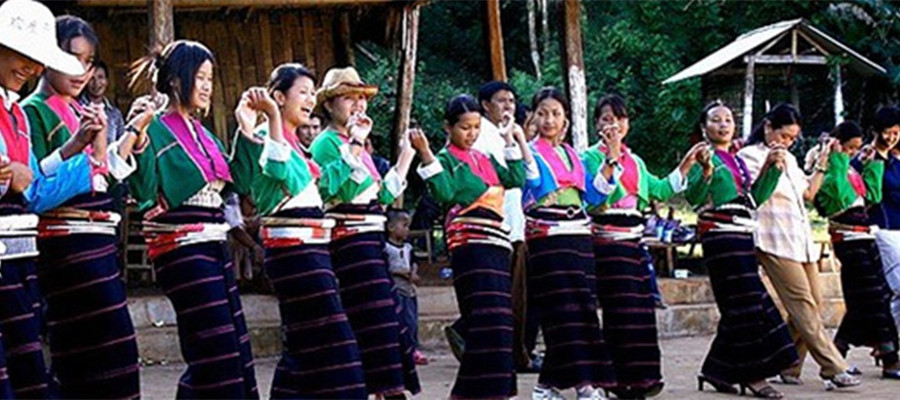Guanmen Festival of Deang Ethnic Minority
Chinese Name: 德昂族关门节
English Name: Guanmen Festival of Deang Ethnic Minority

The religious festival of the Deang ethnic group is called “Jinwa” (the Closure Festival). It is the most significant fasting and purification festival for devout Buddhists. It begins on the fifteenth day of the ninth month of the Dai calendar. During this time, the Buddha statue in the temple is closed to visitors, and the monks engage in meditation and scripture recitation. The community offers food, fresh flowers, and money to the Buddha, with offerings made every seven days. Devout elderly believers reside in the temple to listen to the teachings of the great monk until the fifteenth day of the twelfth month of the Dai calendar (the Opening Festival). After this date, monks are allowed to go out.
Local Activities during the Guanmen Festival
- Temple Reopening Ceremonies: The festival begins with ceremonial rituals to open the temples again after the period of closure. Monks and local leaders conduct prayers and blessings to signify the return to communal worship.
- Community Gatherings: Families and community members come together to celebrate the festival. It is a time for reunion, bonding, and sharing joy among community members, emphasizing the importance of social ties.
- Offerings and Prayers: People prepare various offerings—such as fruits, rice, and sweets—to present at the temples. They engage in prayers and rituals, expressing gratitude for past blessings and seeking future well-being.
- Cultural Performances: Traditional performances, including music and dance, are organized during the festival. These may feature folk songs, traditional dances, and theatrical presentations that reflect Deang culture and history.
- Feasting and Sharing of Food: The Guanmen Festival is marked by communal feasting, where families prepare and share traditional dishes. This act of sharing food fosters a sense of community and togetherness.
- Procession and Celebratory Activities: There may be processions involving participants dressed in traditional attire. These may include symbolic actions, music, and dance, as well as various competitive games that promote participation and enjoyment.
- Storytelling and Oral Traditions: Elders often share stories, legends, and folk tales during the festival. This serves to educate younger generations about their cultural heritage and impart moral lessons.
- Artisan Exhibitions: Local artisans may display their crafts, such as textiles, pottery, and other traditional handicrafts. This showcases the skills and creativity of the community and encourages the economic support of local artisans.
- Charitable Acts: Some community members may engage in acts of charity during the Guanmen Festival, helping those in need and reinforcing the values of generosity and compassion.
- Lighting Lanterns and Fireworks: As the festival progresses, communities may light lanterns and set off fireworks, creating a festive atmosphere. This symbolizes the dispelling of darkness and the welcoming of light and prosperity.

 7 Days GolfingTour
7 Days GolfingTour
 8 Days Group Tour
8 Days Group Tour
 8 Days Yunnan Tour
8 Days Yunnan Tour
 7 Days Shangri La Hiking
7 Days Shangri La Hiking
 11 Days Yunnan Tour
11 Days Yunnan Tour
 6 Days Yuanyang Terraces
6 Days Yuanyang Terraces
 11 Days Yunnan Tour
11 Days Yunnan Tour
 8 Days South Yunnan
8 Days South Yunnan
 7 Days Tea Tour
7 Days Tea Tour
 8 Days Muslim Tour
8 Days Muslim Tour
 12 Days Self-Driving
12 Days Self-Driving
 4 Days Haba Climbing
4 Days Haba Climbing
 Tiger Leaping Gorge
Tiger Leaping Gorge
 Stone Forest
Stone Forest
 Yunnan-Tibet
Yunnan-Tibet
 Hani Rice Terraces
Hani Rice Terraces
 Kunming
Kunming
 Lijiang
Lijiang
 Shangri-la
Shangri-la
 Dali
Dali
 XishuangBanna
XishuangBanna
 Honghe
Honghe
 Kunming
Kunming
 Lijiang
Lijiang
 Shangri-la
Shangri-la
 Yuanyang Rice Terraces
Yuanyang Rice Terraces
 Nujiang
Nujiang
 XishuangBanna
XishuangBanna
 Spring City Golf
Spring City Golf
 Snow Mountain Golf
Snow Mountain Golf
 Stone Mountain Golf
Stone Mountain Golf














